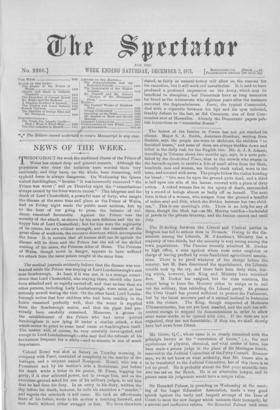The horror of the famine in Persia has not yet
reached its climax. Major S. A. Smith, Assistant-Resident, writing from Bushire, says the people are worn to skeletons, the children "to famished beasts," and some of them are always trodden down and killed in the daily rush for the English rice. Mr. A. J. S. Adams, travelling in Teheran about two months ago, says, in a note pub- lished by the Sunderland 7'inte3, that in the crowds who swarm iit the barrack-square to receive a dole of small silver from the Shah, hundreds, men and women, are literally stark naked, worn to the bone, and covered with sores. The people follow the visitor howling for bread ; "two men lie upon the ground quite dead, and a third is laid upon one side of the bazaar, covered with a piece of dirty cotton. A naked woman lies in the agony of death, surrounded by a crowd of beings almost as badly off as herself. The next form is that of a woman, who scrapes from the ground a handful of melon-seed and filth, which she divides between her two child- ren." This is one morning's ride. There is no help for any of them, though the Shah has—as Mr. Murray testifies—bucketsful of jewels in the private treasury, and the famine cannot end until July.


































